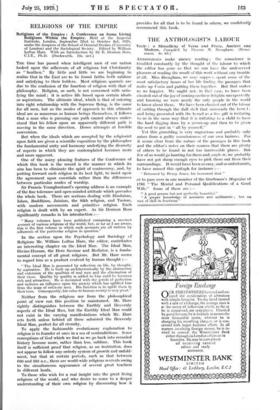RELIGIONS OF THE EMPIRE
Religions of the Empire : A Conference on Some Living Religions Within the Empire. Held at the Imperial Institute, London, September 22nd to October 3rd, 1924, under the Auspices of the School of Oriental Studies (University of London) and the Sociological Society. Edited by William Loftus Hare. With an Introduction by Sir E. Denison Ross, C.I.E., Ph.D. (Duckworth. 16s. net.) THE time has passed when intelligent men of our nation looked upon the adherents of all religions but Christianity
as " heathen." By little and little we are beginning to realize that in the Fast are to -be found faiths both sublime and satisfying to their holders. Most religious quarrels are due to the confusion of the function of religion with that of philosophy. Religion, as such, is not concerned with satis- fying the mind ; it is active life based upon certain ideals or aspirations. The ultimate ideal, which is that of entering into right relationship with the Supreme Being, is the same for all men, but as the modes of approach to this ultimate ideal are as numerous as human beings themselves, it follows that a man who is pursuing one path cannot always under- stand that his fellow upon an apparently different path is moving in the same direction. Hence attempts at forcible conversion.
But when the ideals which are accepted by the religionist upon faith are given a scientific exposition by the philosopher the fundamental unity and harmony underlying the diversity of aspects in which they are contemplated becomes more and more apparent.
One of the many pleasing features of the Conference of which this book is the record is the manner in which its aim has been to eliminate the spirit of controversy, and, by putting forward each religion in its best light, to insist upon the agreement upon essentials rather than the differences between particular modes of worship.
Sir Francis Younghusband's opening address is an example of the fine tolerance and open-minded attitude which pervades the whole book. There are sections dealing with Hinduism, Islam, Buddhism, Jainism, the Sikh religion, and Taoism, with modern movements and primitive religion. Each religion is dealt with by an expert. As Sir Denison Ross significantly remarks in his introduction :--
" Many volumes have been published containing a succinct account of various religions of the world, but, so far as I am aware, this is the first volume in which such accounts are all written by adherents of the particular religion in question."
In the section upon the Psychology and Sociology of Religions Mr. William Loftus Hare, the editor, contributes an interesting chapter on the , Ideal Man. The -Ideal Man, Divine-Human, the Hero Saviour and Mediator, is a funda- mental concept of all great religions. But Mr. Hare seems to regard him as a product evolved by human thought :--
" The Ideal Man is generated by reflection on life, by thought, by aspiration. He is built up architeetonically by the abstraction and extension of the qualities of real mon and the elimination of their vices. Quality by quality is added to him until he becomes rich and attractive. He is decorated with the jewels of perfection and radiates an influence upon the society which has uplifted him from the mass of ordinary mon. His function is to uplift them in their turn. Consequently, his value to human society is very,great."
Neither from the religious nor from the , philosophical point of view can this position be maintained. Mr. Hare rightly distinguishes between the Earthly and Heavenly aspects of the Ideal Man, but ..the Earthly Ideal Man could not exist in the varying manifestations which Mr. Hare sets forth unless behind all these subsisted the Heavenly Ideal Man, perfect for all eternity.
To apply the fashionable evolutionary explanation to religion is to founder at once in a sea of contradictions. Some
conceptions of God which we find as we go back into recorded history become more, rather than less, sublime. This book itself is sufficient proof that religion, as an institution, does not-appear to follow any orderly system of growth and unfold- ment, but that at certain periods, such as that between COO and 500 B.C., there are world-wide religious revivals owing to the simultaneous appearance of several great teachers
in different lands.
To those who wish for a real insight into' the great living religions of the world, and who desire to come to a deeper understanding of their own religion by discovering how it provides for all that is to be found in others, we confidently recommend this book.


























































 Previous page
Previous page